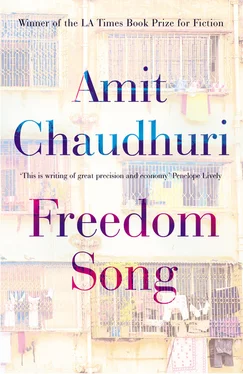It was a little after sunset that it had begun; now it was, to all purposes, night, but a stream of commerce and transactions between human beings continued in aggregations of localities, oblivious to everything else. Some people had come all the way from Shyambazar and Paikpara, with children who had their heads stuck out of the car window most of the way and had to have their hair combed before they got out. Later, there would be people eating at the tables whom no one recognized.
The slow but by now palpable approach of Bhaskar’s car set into motion a small, winglike flutter of panic among the waiting children, cries of ‘Here’s the bridegroom!’, and much tripping on the folds of the unfamiliar garments they were enveloped in. Once more that unearthly ululation was heard, like nothing issuing from the voices of humans. In Sandhya’s father’s heart, as he walked forth swiftly, there was a stirring, like a stab of pain, for his motherless daughter. And in Vidyasagar Road, Bhaskar’s mother, who would arrive later, sat alone with herself as company, become a shadow in the house she’d come to so many years ago.
And when Bhaskar saw the priests, he was startled and mystified. For he had forgotten the sacredness of the enterprise, the pact with ancestry, caste, and divinity which the two priests would make on his behalf. And they would evidently be his wayfarers and guides for the next hour or so.
Both of the priests were touchingly and shabbily self-conscious on the occasion, as a recently married couple might be caught waking up at home. One of them had hair that was oiled and combed back; and the other one, when he opened his mouth, revealed he had a couple of teeth missing.
‘I’ll take the Gold Spot!’
‘Would you like a Gold Spot, Uncle?’
‘Bring one here!’
The children were fighting to serve soft drinks.
‘It’s not quite a bourgeois affair, is it?’
‘I suppose not. What can you say about weddings though — our mothers and fathers did it the same way.’
‘Our parents did a lot of things that. . ask that boy for a Gold Spot.’
Two Party members, in somewhat loud clothes, unusually happy, talking above the music, were inhaling the perfume of sandalwood in smoke and exploring the territory.
He had to look at Sandhya and she at him; the division — a white cloth — was removed. His relatives were teasing him and he had begun to be irritable; he remembered that one meeting they had had, and that he had not dared to look at her properly then, and this seemed to him almost a continuation of that very meeting. ‘Ei, look at him,’ cried her cousins; and she did finally, and smiled, as if at a private thought.
After an hour they both got up at the priest’s command to walk seven times around the fire. When he sat down again, he thought he would open a conversation and say, ‘It’s hot, isn’t it?’ but did not. When Mohit and Sameer and his cousin Arnab approached him to speak to him, as if he had been smuggled into another world but could still communicate in monosyllables with this one, he answered over the droning of the priests with a casual smile and murmur. His nostrils were full of smoke and, now and then, the smell of sandalwood. She seemed quite stoic and self-assured, wiping away the perspiration from her forehead. It was a moment of great loneliness for them, as they sat there, not understanding the mantras; what seemed to be boredom in them was actually an odd, vacant melancholy; but, meanwhile, the photographers craned over each other, bumping into relatives, while the flash-bulbs went off.
They had been asked to repeat their own names; their parents’ names; each other’s names; they had been wished well, in a Sanskrit they did not understand, and a happy married life by Tradition, in the person of these priests. Then one of the priests said, ‘It’s finished,’ to Bhaskar as he rose, surreptitiously, as if imparting a bit of taboo information before leaving. For they had been asked by Bhola to complete the rituals as quickly as they could and had managed to abbreviate a few things and skim guilelessly over others (and dilate a few stanzas, since they were being paid by the hour) and they had finished in just under two hours. The wedding was over, and, though no one appeared to have noticed and they themselves were almost ignorant of it, the two — the young man, who evidently had a backache, and the young woman — were now married. They were at a loss as to what to do now; they had the puzzled air of people who’d just knocked on a door and were on the verge of turning round without having heard a reply from within.
But it was difficult to come to terms with how ordinary it was. The new dhoti was already crumpled; and Bhaskar was wearing his kurta again, shyly.
A bed had been made for them, and complex garlands and tassels of flowers, painstakingly created, hung on all sides around it to enclose the two, at some future moment, in privacy. When they would go, eventually, to Vidyasagar Road, this bed would go with them and climb lightly up all the stairs to Bhaskar’s room.
And after another three days, when Bhaskar had brought his bride to his house and promised, at a ceremony, to provide her with food and clothes for the rest of her life, he grew drowsy; he had spent three days eating.
In the evening, Sandhya took off her wedding sari and went into the bathroom — an interval passed in which her absence was not noticed — and she emerged wearing a red cotton sari, her hair wet. She folded the Benarasi she had been wearing and asked Bhaskar’s mother, ‘Where should I keep this?’
They were in the large room on the second floor, where Bhaskar used to sleep alone. That night they sat on the bed, with gifts on every side.
She seemed reticent.
‘That light is so bare,’ she said, pointing to a light attached to the wall, ‘it should have a lamp-shade.’ He looked at the light.
‘Were you tired today?’ he asked without sincerity.
‘No — were you?’ she asked, folding handkerchiefs that had been received as a gift.
‘Not really,’ he said, suppressing a yawn. ‘Though I am feeling a little sleepy.’ They spoke as if they’d known each other for years, while Vidyasagar Road unfolded before them, invisibly, as if it had never changed. He immediately regretted saying this, because he wanted to talk to her; but his eyes were red and tired.
Later, he went and changed into his kurta and pyjamas and returned and lay upon the bed. Sandhya came out of the bathroom wearing a nightie, tying her hair into a plait. Her shadow hovered upon the wall, trying to find its home here.
‘Where does Piyu sleep?’ she asked thoughtfully.
‘Downstairs,’ he replied.
She considered this silently. Entire childhoods had passed in this room, like a light going out, that she could only sense unclearly. He didn’t know what to do next. As she sat on the bed, he turned around again; he glanced at her narrow back, at the dark skin above the neck of her nightie, the colour of her shoulders. And he wondered why she had decided to marry him; it was probably some entirely trivial reason, something he should be able to imagine but couldn’t. Plausibly, almost touchingly, there might be no good reason: how mysterious the world was at every moment, the birth of love and generations. The nightie, starched cotton, was a pattern of pink flowers with white borders, almost like a curtain, probably made recently by some tailor or chosen from ten nighties that looked nearly the same at some shop; and when she lay down beside him, he scratched his arm and pretended to be tired. But he also felt the guilty, obtrusive stirring of desire; he kept it to himself, instinct or some genetically inherited knowledge instructing him that there was a decorum about these things he must observe. They still had a few of the ornamental marks that had been made along their faces and foreheads, which hadn’t come off with soap; Sandhya’s having been made by an aunt, widowed, forty-two years old, watched by her two twelve-year-old daughters (they were twins). But Sandhya had never known before now, the eve of her wedding, the minor artistic accomplishments this aunt, who lived on Vivekananda Road, possessed; actually, she did not know her very well; but she had, with a clove dipped repeatedly in sandalwood paste, made, with every tiny pin-prick impress, those subtle marks on her forehead. If there was one thing she would have liked to keep from that day it would have been these patterns.
Читать дальше












